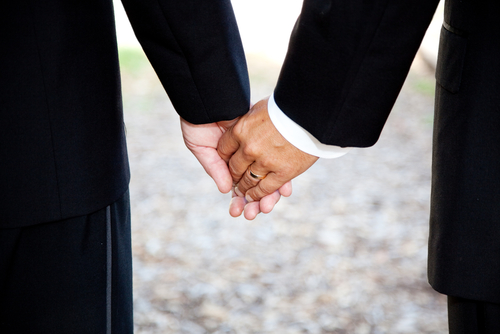Section 28 was a shameful piece of legislation prompted by fake news
Posted: Wed, 23rd May 2018 by Terry Sanderson
Thirty years after the government banned local authorities from 'promoting' homosexuality, Terry Sanderson reflects on the hysteria that prompted Section 28, the fear it caused and the backing religious fanatics gave it.
The struggle for gay rights in this country over the past fifty years could easily be perceived, by those who weren't involved, as a relatively quick transition from total illegality to near equality.
The anti-gay legislation that for centuries had tormented and destroyed gay people was being challenged. But it was a long, slow and tortuous process, punctuated by enormous setbacks.
Not least of these was the introduction by the Thatcher government in 1988 of Section 28 of the Local Government Act, which banned something that didn't exist – namely, "the promotion of homosexuality" by local authorities.
It seems almost surreal now, looking back, to imagine that such a regressive and repressive piece of legislation could even have been contemplated, let alone enacted, in the late 20th century. It was, of course, the initiative of ostentatiously religious parliamentarians such as David Wilshire and Dame Jill Knight and enthusiastically taken up by pious peers and the Bench of bishops.
In a way it wasn't really about homosexuality. At the time of its implementation there was a battle royal going on between the Labour Party and Mrs T's old-fashioned authoritarian Conservatives. The media was mostly backing the Conservatives of course, and newspapers such as The Sun and the Daily Mail had taken it upon themselves to act as the propaganda arm of the Tory Party.
The new brashness that the tabloids had embraced since Kelvin McKenzie became editor of The Sun saw the birth of what was later to be known as 'fake news'. This was a battle not only between the political parties but also between the tabloids, who were fighting their own bitter circulation wars. The result was an increase in crudeness and extremism in the redtops as they fought for a diminishing number of readers.
Caught in the middle of this was a very handy scapegoat – the gay community, a ready-made unpopular minority. The lives of gay people were ruthlessly used to discredit the Labour party. The tabloids lied, distorted and invented 'gay scandals' and as part of this propaganda war, the 'Loony Left' was created.
If you took your information from The Sun, the Daily Express or, in fact, any of the papers with the exception of The Guardian and The Independent, you would have imagined that huge amounts of taxpayers' money was being spent by Labour-controlled councils on gay causes. You would think gay activists (the 'gay mafia' as we were known) were infiltrating schools with the intention of 'turning pupils into homosexuals' by some alchemy never explained.
Remember, this was at a time before the internet, when the traditional media – newspapers, TV and radio – had almost total control over what we knew about world and domestic events. Mass circulation newspapers were abusing this power, presenting a distorted and biased view of the news that was difficult to contradict without a similar platform.
The Times columnist Bernard Levin was, like so many others, alarmed by the way the press was behaving towards gay people and it prompted him to write: "Homosexuals are being portrayed – portrayed literally as well as metaphorically – as creatures scarcely human; they are being abused not in the old mocking way but in the foulest terms, meant with deadly seriousness; they are experiencing an increasing discrimination over a whole range of situations; already voices have been raised demanding the 'cleansing' of schools as they have been for purging the church."
The catalyst came in the form of a modest little book called Jenny Lives with Eric and Martin, aimed at helping children who were living in a same-sex household to find some validation. It had been originally published in Denmark where it had been regarded as unremarkable. But suddenly in the English translation, this book (little more than a pamphlet really) became, in the eyes of the tabloids, almost equivalent to Mein Kampf in its promotion of evil. They claimed it was being widely distributed in schools run by Labour local authorities, which was an out and out lie. When a complaint was made to the Press Council about The Sun's coverage, the watchdog described it as "exaggerated and misleading" but that was long after the damage had been done.
The increasingly hysterical attacks on the book went on day after day and eventually it led to the now notorious speech by Mrs Thatcher at the Tory party conference in 1987 in which she said: "Children who ought to be taught traditional moral values are being taught they have an inalienable right to be gay. All of those children are being cheated of a sound start in life."
This, again, was entirely untrue but Thatcher was building on the propaganda that her press lapdogs had conjured up from nothing.
The stage was set for Section 28.
As the legislation went through parliament, the abusive language and the anti-gay rhetoric that attended the debate increased in volume. The present prime minister, Theresa May, was an enthusiastic supporter of the legislation, saying parents would find comfort in knowing that Section 28 was in place.
The legislation caused genuine fear among LGBT people. Many of us wondered what it might lead to, what new repression could be built on the back of it.
However, rather than cowing the community into silence, it had an electrifying effect on activism. New pressure groups formed, free speech advocates joined civil rights campaigners and there were huge demonstrations in both London and Manchester.
Mrs Thatcher and her press lackeys had intended Section 28 to be a lethal blow to the increasingly assertive gay community and, at the same time, a reassurance to her heartlands that 'perversion' would not triumph. But it had the opposite effect. It created a new generation of activists who thought nothing of invading the BBC News and abseiling into the House of Lords.
Although no-one was ever prosecuted under the terms of Section 28, its intention had been to show the voting public that Mrs Thatcher was, like them, a traditionalist. She would not tolerate anything that challenged her idea of the moral order. Although it was never tested in court, there is no doubt that Section 28 caused widespread self-censorship among artists and academics.
In the end, Thatcher's attempted exploitation of homophobia for political advantage backfired. The electorate were not, in the main, as outraged about homosexuality as she was. Despite the relentless tabloid hysteria and prurience, there was an increasing liberality in society. The elderly parliamentarians who had driven much of this bigotry in Westminster were dying out.
After Thatcher, John Major tried to reinvent the Conservatives as the party of compassion and caring. The country had had enough of Mrs Thatcher's bossy prudery.
But Major had his own disaster when, in 1993, he tried to launch a campaign he called Back to Basics. He had not meant it as a finger-wagging exercise about moral laxity (the sort of thing Mrs Thatcher would have revelled in) but that is how the press had perceived it.
Within days of his speech the tabloids started a campaign aimed at outing every gay Tory it could find and unearthing and poring over the sexual shenanigans of straight MPs, too. Politicians waited with keen apprehension each Sunday for the News of the World to arrive, to find out who the next victim of its cruel exposés would be.
It all paved the way for Tony Blair's triumphant entry into Downing Street.
But it took until 2003 for Section 28 to be finally removed from the statute book. Even that took several attempts. The first, in 2000, was carried with the three-line whip in the House of Commons, but was then defeated in the House of Lords by the bishops and a cabal of right-wing, religiously-motivated peers. Among these was Baroness Janet Young who was, at the time, a patron of the Christian Institute – which had led a mischievously dishonest campaign in favour of Section 28 and against its repeal.
Throughout its existence, Section 28 was enthusiastically supported by the Salvation Army, the Afro-Caribbean Evangelical Alliance, Christian Action and Research and Education, the Muslim Council of Britain, the Catholic Church and elements within the Church of England.
Looking back, the whole thing seems ridiculous. In hindsight, Mrs Thatcher seems like some grotesque comic figure and Lady Young a religious fanatic. How did we ever take them seriously?
But we should not forget that a very similar law to Section 28 was enacted in Russia only a few short years ago and still applies today. Where did Vladimir Putin get the idea for this? Our very own version was surely the model.
Putin's law is used to justify all kinds of violence and persecution against gay people now and, in that sense, the British LGBT community may have had a narrower escape than we realise.
Share your story
Secularism isn't just about moral or theoretical arguments, it's about people's real lives. Telling your story can help our campaigns and others in similar situations.








